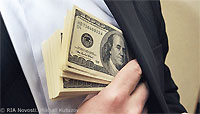March of the oligarchs
BusinessNewEurope - www.bne.eu - 4.2.12 - JRL 2012-60
If Forbes magazine is to be believed, 2011 was good year for the world's wealthiest individuals.

file photoIn its March edition, Forbes lists the world's billionaires in an exercise the magazine began 25 years ago, when it identified 140 people that were worth a billion dollars or more, mostly Americans. This year's list contained a massive 1,226 billionaires (up from 1,210 in 2010), who had a combined net worth of a record $4.6 trillion. So the crisis doesn't seem to have hurt everyone, then.
What continued in this year's list is the growing importance of the emerging markets in the make-up of the world's wealthiest. The BRIC nations are home to a quarter of the names on the 2011 list, up from 10% in 2006. Of the 310 billionaires in Europe the world's richest region Russia dominates, being home to 96 billionaires this year, up from 79 in 2010
The increasing number of ultra-high net worth individuals in Russia should come as no surprise; bne reported last year that the chance of becoming a billionaire is the highest in Russia. Between 2004 and 2011, Russia produced one billionaire for every 1.87m people, compared with the US, the next best place to be, where one billionaire was created for every 2.29m. "After all, there certainly weren't any billionaires in Russia in 1991 when the Soviet Union was dissolved, and probably none until 1994 when the first businessmen began to secure control over privatised property. But since then, Russia has been churning out billionaires by the dozen every year," says Jacob Nell, an analyst with Morgan Stanley in Moscow, who calculated the odds of becoming a billionaire in each market.
Shadowlands
Despite the glitter of the Forbes list, the US magazine has only scratched the surface of who owns the wealth in emerging markets. bne has found there are dozens of other names that should be on the list some that are obvious, some that aren't. Clearly, Forbes grossly underestimates the number and wealth of the region's richest. "I could give you at least another 10 names, but I am not sure it is a good idea," says one high-profile banker in Moscow. "Some of the oligarchs don't mind being famous, but there are a lot more that don't want the attention. If I gave you the names, it would be dropping a hot brick in my lap and in theirs."
The bulk of Russia's money which is home to half of the richest men in Europe exists in the "shadowlands": this money is not necessarily illegally acquired, but the power of the Russian state and the unpredictability of the business environment means that if you have money and want to keep it, then it is usually advisable to keep your head down.
Just how many billionaires are "really" out there? Quantifying the acknowledged and more public wealth of the world's most successful businessmen and women is a tricky business. In addition to hiding much of their wealth from the powers that be, even the publicly acknowledged rich in the West have complex investments, some of which are public and some of which are not. For example The Economist has attempted to disentangle the empires of both British billionaire Richard Branson (#255 on the list, worth $4.2bn in 2011) and Swedish furniture king Ingvar Kamprad (#377, $3bn) only to conclude that